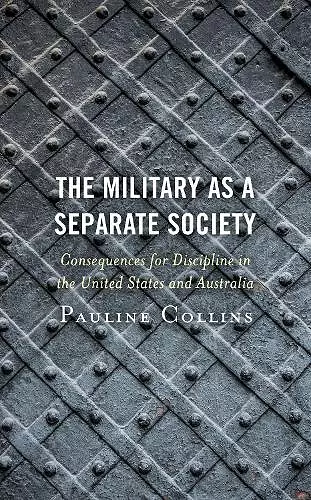The Military as a Separate Society
Consequences for Discipline in the United States and Australia
Format:Hardback
Publisher:Bloomsbury Publishing PLC
Published:9th Oct '19
Currently unavailable, and unfortunately no date known when it will be back

The exercise of public power by the military in civilian Western democracies such as Australia and the United States demonstrates a tendency toward diminished responsibility for moral behavior. Pauline Collins argues that a different system of military criminal investigation and discipline outside the civilian justice system enables the military to operate like a coterie and can lead to a failure in the requisite moral standard of behavior required of military personnel and maintaining civilian institutional control. Collins argues that the justifications for separate treatment weakens both the military reputation and the practice of civilian control of the military as well as leading to an overall decline in morality and values in a democratic society.
As a legal officer in the Australian Army Reserve (now long retired), I personally encountered numerous aspects of Pauline Collins’s excellent work, The Military as a Separate Society, in particular the complicated questions raised by the extent of civilian institutional control over the military. This is a comprehensive work, and possibly the only one of its kind, to perform such a detailed analysis of the American and Australian experiences. Certainly at least for military legal officers, it is a compelling read. For those presently serving, it provides a valuable insight into the nuances of how these questions are viewed institutionally. For those who have left the service, this book vividly brings to life the vexed issues they likely were called upon to resolve, and it will leave them wishing that such a valuable resource had been available to them earlier. -- Ken Yin, Edith Cowan University
Professor Collins has developed significant expertise in the area of ‘military law’, and this book represents another impressive work in this area. Professor Collins significantly challenges the status quo in terms of courts martial, applying different rules, principles and procedures to alleged wrongdoing in the military context, in comparison with principles of more general application. She carefully documents the claimed justifications for such a differential arrangement, convincingly demonstrating that the arguments in favor of it are highly vulnerable. Yet courts both in the United States and Australia have proven to be extremely reluctant to challenge this status quo. It creates obvious tensions with the rule of law and the idea that all are treated equally in our legal system(s). As this book more than ably demonstrates, the truth is that, as it currently stands, and with apologies to George Orwell, some are more equal than others.
The book also masterfully demonstrates the practical implications of such a bifurcated system. The practical implications for those subject to a military ‘court’ proceedings are real enough. However, what may be even more insidious is the contribution that this bifurcated system might have on the culture of the military. It has been well documented that there have been very serious behavioral issues relating to some members of the defense force, their treatment of other personnel and their ideas as to appropriate workplace behavior. Few have dwelled upon the possible link between the system of military justice, and the idea the military is different such that ordinary legal norms and rules do not apply, and broader cultural and behavioral problems within the military, that the military has recently identified and begun to tackle. This book does so, setting out in devastating detail the all too real implications of a system where hierarchy, command and control have been permitted to over-rule virtually all else, and where some individuals may believe they are above the law. It can only be hoped that decision makers will read this important work, with a view to consideration of reform in this area. Professor Collins’ work in this field, including this book, should be a critical reference point in this debate. This book is extremely valuable, documenting longstanding problems with existing models, with a view to consideration of reform. It has a potentially important practical application. I highly commend this book.
ISBN: 9781498557047
Dimensions: 225mm x 161mm x 31mm
Weight: 694g
340 pages